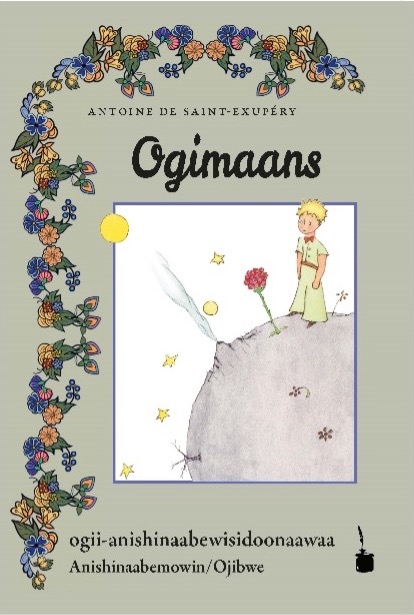Ogimaans (The Little Prince) Book

Original story by Antoine De Saint-Exupéry
Translated by Angela Mesic, Margaret Noodin, Susan Wade and Michael Zimmerman Jr.
Cover designed by Rachel Butzin
Ogimaans is the first translation of The Little Prince in an Indigenous language of the North American continent. Overall, the book has now been translated into 445 languages and dialects! Ogimaans is #134 by Edition Tintenfass. Edition Tintenfass hopes that The Little Prince will be translated into more indigenous languages of North America, and they would be happy to help.
Le Petit Prince is a story beloved by readers across the globe. It is an aadizookaan, an epic teaching tale, that speaks to our souls about the secrets and lessons of being alive. As it moves from one language to another the core meaning remains the same, but each translation offers a perspective on being that contributes to our shared understanding. For instance, when the little prince visits with the fox before leaving, we see through translation, the various ways separation and secrets are viewed. Moving between languages in the same Indo-European family, the differences are subtle. “Adieu,” dit le renard. “Voici mon secret. Il est trés simple: on ne voit bien qu’avec le coeur. L’essential est invisible pour les yeux.” is very similar to “Good-bye,” said the fox. “And now here is my secret, a very simple secret: It is only with the heart that one can see rightly; what is essential is invisible to the eye.” However, when the sentiment moves into a language of another family, in this case Anishinaabemowin, an interjection becomes a verb phrase and a promise to be together again. Additionally, the metaphors are entirely changed. There is no comparison between seeing with one’s heart or with one’s eyes. There is instead a reminder that by letting go of what is material one can best understand emotions and ideas. The literal translation of “Giga-waabamin,” ogii-idamini waagoshan. “Noongom giwii-wiindamoon gaadooyaan, wenipanag: Mii eta dash giwii-nisidawendaan apii boonigidetaazoyan bwaa-waabanjigaadeg maamawigichi-inendaagwag.” is close to: “I will see you again, said the fox. Now I will tell you what I have been hiding which is simple: You will understand when you let go of everything that the unseen is most important.” This is the magic of the little prince, by listening to him, we learn to listen better to ourselves and all the beings who have secrets to share.
Anishinaabemowin is the language of the Odawa, Potawatomi, and Ojibwe people centered in the Great Lakes region of North America. It is currently used in more than two hundred Anishinaabe communities in Quebec, Ontario, Manitoba, Saskatchewan, Alberta, North Dakota, Michigan, Wisconsin, and Minnesota. Like many indigenous languages, its vitality is precarious. Although some of our most beloved elders and teachers left us in recent years, the number of speakers is beginning to hold steady. What we write today will be the bridge our future children have to the past.
This edition conforms to the spelling used in the western part of the diaspora. A few practical facts bear repeating to encourage those not familiar with Anishinaabemowin to dive into a book filled with long lines in a new language. The spelling system used in this volume is called Fiero Double Vowel. Although this is the most common writing system in the southern Great Lakes region, there are syllabic alphabets, folk-phonetic systems, alternate spellings, and other vocabulary choices that make the language of each community distinct.
To sound out the words remember the following comparisons to English: A single a sounds like the u in cup. / Double aa’s sound like the a in father. / One e sounds like the e in the French word café. / One i sounds like the i in words like bit, little, sip. / Two ii’s sound like the ee or ea in knee, peach or each. / A single o may sound like the au in caught, or the u in put. / Double oo’s sound like oo’s in too, soon or moon. / Consonants represent the same sounds as in English, but f, l, r, v, and x are never used. There are also consonant clusters: sk, shp, sht, shk, mb, and nd.
We thank the little prince, the fox, his rose and Antoine de Saint-Exupéry for the original story. We thank Edition Tintenfaas, Jean-Marc Probst, and all the translators before us for extending its reach. We thank the maanidog and aanikoobijiganag of Anishinaabemowin who created the language we continue to use. And we thank all the friends and family who encouraged us for the many years it took to complete this project, especially Walter and Nadine Sauer who always believed it could be finished one day.
– Margaret Noodin
How to Purchase
Vocabulary
Here are some of the most interesting or frequently used words from the translation.
Nouns with a parenthesis attached to it note the plural ending.
For example, gichi-jiingwaan(an) – asteroid. Gichi-jiingwaan (one asteroid), gichi-jiingwaanan (more than one asteroid).
aadawaa’am-ogimaa(g) – planet(s)
Akiing – Earth
anamikaw – to salute someone
aniibiish – petal
awiiya – someone, somebody
babaami-ayaad geyaabi – continue on his journey
bagwadakamik(oon) – desert
biiwaabiko-zagaakwa’igan(an) – bolt(s), as in the metal fastener
bingwi(in) – sand(s)
gaawizigan (an) – thorn(s), something used for someone to be sharp
gagiibaadizi – to be absurd
gibidoonezhigan(an) – muzzle(s)
gichi-inendaadgwad(oon) – matters of consequence that which are important
gichi-jiingwaan(an) – asteroid
goopaadizi – naive
maamiikwaazowinini – conceited man
maji-izhewebag – catastrophe
mayagigin – weed
minwaabam – to admire someone
minwaabanjigaazo – to admire
netaaminikweshkijin – tippler
niijiins – my little man, my dear little man
ogimaakandaago – to be ordered
ogin(iig) – rose(s), used as animate when speaking of THE rose
wawiizhimigo – to praise
wayaazakonenjiged – lamplighter, someone who lights the street lamp
wedaawewinini – businessman
weweni – respectfully
zaagikii(n) – plant, something that grows out of the earth
Famous Quotes
Over the years many of the quotes have become quite well known. Here are a few favorites!
“Awashime zanagad wii-dibaakonidizoyan apii dibaakonadwaa. Giishpin gidaa-dibaakonidiz gwayak, geget igo nibwaakaayan aapiji.”
“It is much more difficult to judge oneself than to judge others. If you succeed in judging yourself rightly, then you are indeed a man of true wisdom.”
“Gakina netaawigijig gii-oniijaaniziwag aanawi aanind minjimendamowaad geyaabi.”
“All grown-ups were once children– although few of them remember it.”
“Noongom giwii-wiindamoon gaadooyaan, wenipanag: Mii eta dash giwii-nisidawendaan apii boonigidetaazoyan bwaa-waabanjigaadeg maamawigichi-inendaagwag.”
“And now here is my secret, a very simple secret: It is only with the heart that one can see rightly; what is essential is invisible to the eye.”
“Ahaw, indaa-zhiibendaan bi-ayaawaad niizh gemaa niswi wemakwaayaanenhyag giishpin wii-ani-nakweshkawagwaa memengwaag.”
“Well, I must endure the presence of two or three caterpillars if I wish to become acquainted with the butterflies.”
Nigii-waabanda’aag i’iw nitaamazinibii’amaan netaawigijig, miinawaa dash gii-gagwejimagwaa giishpin zegiziwaad.
Aanawi gaa-nakomiwaad: “Nizegizimin ina? Aaniin dash daa-gositawendamaang desiwiiwakwaan?” Gaawiin nigii-mazinibii’anziin desiwiiwakwaan. Nigii-mazinibii’aan gichiginebig biniskwaagamizitawaad jejiibajikiiyan. Aanawi dash gaawiin ogii-nisidotanziinaawaa netaawigijig, gaa-mazinibii’amaan miinawaa: gaa-mazinibii’amaan biinji-ayaad gichiginebigong, mii sa daa-nitaawaabandamowaad netaawigijig. Gaagige-noonde-waawiindamaagowag. Ekwa Niizhing Mazinibii’igan gaa-izhinaagwad:
I showed my masterpiece to the grown-ups, and asked them whether the drawing frightened them.
But they answered: “Frighten? Why should anyone be frightened by a hat?” My drawing was not a picture of a hat. It was a picture of a boa constrictor digesting an elephant. But since the grown-ups were not able to understand it, I made another drawing: I drew the inside of the boa constrictor, so that the grown-ups could see it clearly. They always need to have things explained. My Drawing Number Two looked like this:


